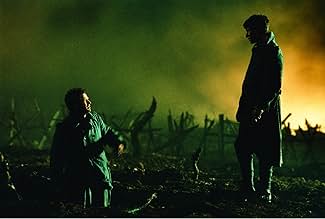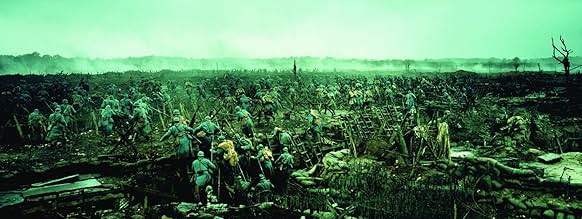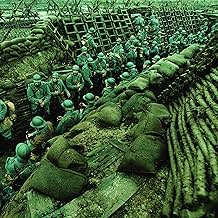A busca implacável de uma jovem por seu noivo, que desapareceu das trincheiras do Somme durante a Primeira Guerra Mundial.A busca implacável de uma jovem por seu noivo, que desapareceu das trincheiras do Somme durante a Primeira Guerra Mundial.A busca implacável de uma jovem por seu noivo, que desapareceu das trincheiras do Somme durante a Primeira Guerra Mundial.
- Direção
- Roteiristas
- Artistas
- Indicado a 2 Oscars
- 17 vitórias e 35 indicações no total
Jean-Pierre Darroussin
- Benjamin Gordes
- (as Jean Pierre Darroussin)
Jean-Pierre Becker
- Esperanza
- (as Jean Pierre Becker)
Jean-Paul Rouve
- Le facteur
- (as Jean Paul Rouve)
Elina Löwensohn
- La femme allemande
- (as Elina Lowensohn)
Avaliações em destaque
A gorgeous film about love, search, hope and fight. Colors from "Amelie", touching Gaspard Ulliel, delicate performing of Audrey Tautou, impressive presence of Jodie Foster. And flavor of a lost world, so persistent, so heavy, so ambiguous.
A splendid French adaptation of a novel but, more important, a subtle exploration of miracle's rules. At first sight, it is a story about believe. At the second- hope in the skin of nostalgic images. But in fact, it is end of innocence. Manech is not the boy-friend, the good guy from an old lighthouse, he is the sense of Mathilde's existence. The poor signs to know if he is alive, the contact with lives of others, the postman like angel of new part in interior universe, the joy and the final silence are elements of a intangible miracle.
That is the motif to discover this film like second part of "Amelie Poulain". Same director or same actress are irrelevant details for explain the feeling because the message is more important than any definition. The principal character are not the war/ search/love/ sacrifice/hope. The fundamental problem is the sense of life, yesterday or tomorrow, the gestures of world's discover, the taste of miracle and the touch of his shadow.
A splendid French adaptation of a novel but, more important, a subtle exploration of miracle's rules. At first sight, it is a story about believe. At the second- hope in the skin of nostalgic images. But in fact, it is end of innocence. Manech is not the boy-friend, the good guy from an old lighthouse, he is the sense of Mathilde's existence. The poor signs to know if he is alive, the contact with lives of others, the postman like angel of new part in interior universe, the joy and the final silence are elements of a intangible miracle.
That is the motif to discover this film like second part of "Amelie Poulain". Same director or same actress are irrelevant details for explain the feeling because the message is more important than any definition. The principal character are not the war/ search/love/ sacrifice/hope. The fundamental problem is the sense of life, yesterday or tomorrow, the gestures of world's discover, the taste of miracle and the touch of his shadow.
10Libs
It is almost insulting to compare this film to Amelie Poulain. Yes it's the same crew, yes it's the same director and yes, Audrey Tautou almost plays the same character. But give JP Jeunet a break, it's part of HIS style. Would you blame Beethoven because his symphonies kinda sounded the same?
It is at times gritty, with its very tough depictions of the Great War, and at times light and naive. It all follows a very complicated storyline which is, I would have to admit, the only weakness in this otherwise perfect movie. With so many characters and so many plot elements, some people may feel a bit lost, specially toward the end. But this is of lesser concern as the audience will still follow the main idea : a quest to find a loved one. So even through all the intricacies of the subplots, the arc story (and its finale) always remain on the horizon.
To put it short, the movie is a masterpiece. The acting is strong, the scenes are breathtaking and overall, so much attention has been put to details that it feels like a labor of love more than a big production movie. I truly think that if French cinema was not so locked into producing crappy talkative movies about losers and failures, it could come up with a lot more movies as poignant as Engagement is.
It is at times gritty, with its very tough depictions of the Great War, and at times light and naive. It all follows a very complicated storyline which is, I would have to admit, the only weakness in this otherwise perfect movie. With so many characters and so many plot elements, some people may feel a bit lost, specially toward the end. But this is of lesser concern as the audience will still follow the main idea : a quest to find a loved one. So even through all the intricacies of the subplots, the arc story (and its finale) always remain on the horizon.
To put it short, the movie is a masterpiece. The acting is strong, the scenes are breathtaking and overall, so much attention has been put to details that it feels like a labor of love more than a big production movie. I truly think that if French cinema was not so locked into producing crappy talkative movies about losers and failures, it could come up with a lot more movies as poignant as Engagement is.
An epic love story on a World War I background. Far from Amelie, the team Jeunet/Tautou demonstrates his talent, showing with poetry love and war, beauty and horror, sweetness and violence. Mathilde and Manech, played by the stunning Audrey Tautou and the new French heart-throb Gaspard Ulliel, are the ideal lovers, determinate, passionate, separated by destiny, hoping...because hope is the message, the only one of a film where love is giving and giving again. If you loved Cold Mountain you will adore "A very long engagement". If don't know yet what it is to hold someone's heart in your hand, to feel the beatings of somebody's heart like the Morse alphabet, this movie will explain it to you, and you never will be the same anymore.
10lawprof
Director Jean-Pierre Jeunet in the hit, "Amelie," employed scintillating Audrey Tatou, the most expressive young French actress in film today, to portray a whimsical and charming girl-woman in search of love. With her now as a young French rural ingénue searching for years after The Great War (aka World War I or, even better, The War to End All Wars) for a probably killed fiancé, Jeunet crafted a moving, often penetrating story centering on the charnel carnage of trench warfare.
Lame as a single-digit-age child because of polio and living with relatives who took over after her parents were killed in an accident, Mathilde is befriended by Manech (Gasparad Ulliel). Mathilde, a loner separated from her peers by her disability, and Manech become closest friends. Late adolescence brings love and lust, commitment and an engagement.
But in 1917 the French Army needed fresh meat for the bloody maw that was warfare on the almost terminally static Western Front. And off went Manech along with many others who never returned.
Employing the harshest discipline of any Western army in modern history, the French Army (which gave the world the Dreyfus trial and in World War I actually used decimation to punish mutinous regiments and divisions) sentences Manech and four others to be cast into No Man's Land without weapons, without any possibility of being allowed to return but with the macabre requirement that they respond to morning roll call if alive (not a good bet). Their alleged crime was self-mutilation to get out of combat (what we call in the American military, "SIW," Self-Inflicted Wounds).
Mathilde in 1920, steely faithful in a moving and believable way, searches fervently for her fiancé whom she believes "must" be alive somewhere, somehow. Employing artful stratagems and enlisting the willing, the paid and the dragooned, her search takes her to cities and battlefields. With resort to a child's employment of magical thinking she frequently whispers tests about what will happen in immediate, ordinary circumstances with one result "proving" for her that Manech is still alive. Tatou makes this self-deception appealing and infinitely sad.
As Spielberg did in "Saving Private Ryan," Jeunet brings the immediacy of the meat-grinding battlefield to the viewer over and over again through superb if sometimes difficult to watch cinematography. Of course no film truly captures the desperation, the epidemic fatality that gripped and demoralized the French Army after years of immobile, set-piece fighting. One needs to read Robert Graves or Siegfried Sassoon for that. But Jeunet has brought to the screen the most realistic World War I trench scenes since "All Quiet on the Western Front" (the 1930 original, of course).
Tatou is an acting tsunami here, alternately beguiling and tense and always hopeful while fighting despair. Expect to see her in many fine roles in the future. She's marvelous.
The entire cast is excellent-few are known in the U.S.
A remarkable movie with an ending that will satisfy and disturb at the same time.
Tatou and Jeunet deserve Oscar nominations.
10/10
Lame as a single-digit-age child because of polio and living with relatives who took over after her parents were killed in an accident, Mathilde is befriended by Manech (Gasparad Ulliel). Mathilde, a loner separated from her peers by her disability, and Manech become closest friends. Late adolescence brings love and lust, commitment and an engagement.
But in 1917 the French Army needed fresh meat for the bloody maw that was warfare on the almost terminally static Western Front. And off went Manech along with many others who never returned.
Employing the harshest discipline of any Western army in modern history, the French Army (which gave the world the Dreyfus trial and in World War I actually used decimation to punish mutinous regiments and divisions) sentences Manech and four others to be cast into No Man's Land without weapons, without any possibility of being allowed to return but with the macabre requirement that they respond to morning roll call if alive (not a good bet). Their alleged crime was self-mutilation to get out of combat (what we call in the American military, "SIW," Self-Inflicted Wounds).
Mathilde in 1920, steely faithful in a moving and believable way, searches fervently for her fiancé whom she believes "must" be alive somewhere, somehow. Employing artful stratagems and enlisting the willing, the paid and the dragooned, her search takes her to cities and battlefields. With resort to a child's employment of magical thinking she frequently whispers tests about what will happen in immediate, ordinary circumstances with one result "proving" for her that Manech is still alive. Tatou makes this self-deception appealing and infinitely sad.
As Spielberg did in "Saving Private Ryan," Jeunet brings the immediacy of the meat-grinding battlefield to the viewer over and over again through superb if sometimes difficult to watch cinematography. Of course no film truly captures the desperation, the epidemic fatality that gripped and demoralized the French Army after years of immobile, set-piece fighting. One needs to read Robert Graves or Siegfried Sassoon for that. But Jeunet has brought to the screen the most realistic World War I trench scenes since "All Quiet on the Western Front" (the 1930 original, of course).
Tatou is an acting tsunami here, alternately beguiling and tense and always hopeful while fighting despair. Expect to see her in many fine roles in the future. She's marvelous.
The entire cast is excellent-few are known in the U.S.
A remarkable movie with an ending that will satisfy and disturb at the same time.
Tatou and Jeunet deserve Oscar nominations.
10/10
A powerful and emotional war drama from French auteur Jean-Pierre Jeunet. Audrey Tautou leads us through an engaging and well-crafted story which sweeps us into the world of its characters, whom are established and well developed as the story progresses. The film itself is visually arresting with stunning cinematography. It was actually Bruno Delbonnel's visuals that acted as one of the man aspects that allured my interest in the film, it's a visual powerhouse blending the gritty conventions of war with scenes of a more romantic and dramatic style. A harrowing and emotional account of World War I from the perspective of French soldiers and civilians.
Você sabia?
- CuriosidadesWhen casting Jodie Foster, Jean-Pierre Jeunet met her in Paris at the café which was used to shoot the scenes in O Fabuloso Destino de Amélie Poulain (2001) which is near where he lives. Some tourists were at the café, knowing it was featured in the film, asked Jeunet and Foster to move out of the way (not recognizing them) so that they could take a photograph of the café.
- Erros de gravaçãoIn the film there is an important storyline about an albatross. However, throughout the film in all footage depicting the albatross a gannet is shown. Though a gannet is also a large seabird, it looks nothing like an albatross.
- Citações
Ange Bassignano: [writes] "Revenge is pointless. Try to be happy and don't ruin your life for me."
- ConexõesEdited from Migração Alada (2001)
- Trilhas sonorasÇa ne Vaut pas l'Amour
Music by François Perpignan
Lyrics by Alexandre Trébitsch
Performed by Esther Lekain
Principais escolhas
Faça login para avaliar e ver a lista de recomendações personalizadas
- How long is A Very Long Engagement?Fornecido pela Alexa
Detalhes
- Data de lançamento
- Países de origem
- Idiomas
- Também conhecido como
- A Very Long Engagement
- Locações de filme
- Héaux de Bréhat, Côtes-d'Armor, França(lighthouse exteriors)
- Empresas de produção
- Consulte mais créditos da empresa na IMDbPro
Bilheteria
- Orçamento
- US$ 56.600.000 (estimativa)
- Faturamento bruto nos EUA e Canadá
- US$ 6.524.389
- Fim de semana de estreia nos EUA e Canadá
- US$ 101.749
- 28 de nov. de 2004
- Faturamento bruto mundial
- US$ 69.424.389
- Tempo de duração
- 2 h 13 min(133 min)
- Cor
- Mixagem de som
- Proporção
- 2.35 : 1
Contribua para esta página
Sugerir uma alteração ou adicionar conteúdo ausente

























